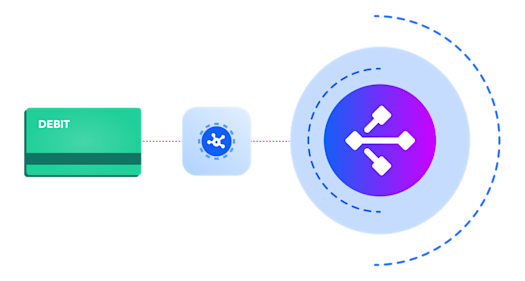More importantly, can merchants do Debit Routing effectively with an existing global Network Token?
Last time, we covered the expansion of Durbin 2.0 to include CNP transactions, which are primarily PINless and occur online.
The expanded focus on Card Not Present (CNP) transactions in the Durbin 2023 revision has implications across networks, merchants, issuers, and consumers, especially around security. That’s where tokenization comes in. With tokenization in the picture, there are two kinds of transactions merchants will need to manage -
| Transaction Type | What should merchants do? | |
 |
Non-Tokenized transactions with a PAN (Business as Usual) | Merchants should stay informed about their options for a given payment credential on both the domestic and global card networks. This enables them to make the best decisions for their business. |
 |
Network Tokenized transactions by obfuscating the PAN (New Area) | One of the main concerns merchants need to consider with CNP PINless Debit transactions is security - that is, the absence of a secondary layer of authentication (the PIN) makes it less secure. |
So, what does enhance security?
Network Tokens.
Global card networks add a layer of security when they replace PANs with Network Tokens, enhancing both convenience and security for merchants.
The processor-agnostic nature of Network Tokens allows for better pricing and payments operations - some merchants may choose to get Network tokens from their main processor, but many merchants are achieving greater operational efficiencies and a better cost structure from provisioning Network tokens directly in their core systems. Network Tokens that can be used across processors also help eliminate multiple fee assessments associated with each provider. Through its direct integrations with the networks and processors, VGS is one of the leading providers of universal, processor-agnostic global payment tokenization. This includes offering options to merchants to use Network Tokens across processors or even when their processors don’t support it.
As Network Tokens gain broader acceptance as a technology that secures mainly CNP transactions, coupled with the Durbin 2.0 focus on CNP, the role of Network Tokens in tokenizing debit transactions is set to become more influential.
What are Network Tokens?
Network Tokens behave like a PAN without the associated security risks. By replacing the original PAN with a unique token from the card networks, Network Tokens preserve security during the storage and transaction processing of cards - raising approval rates and minimizing fraud. In addition, as a result of being compatible across multiple processors, Network Tokens can add operational efficiencies for merchants.
Global vs. Domestic Networks
We outlined a typical situation above - a merchant processes a CNP Debit transaction on a global network and uses Network Tokens to secure these on the same network. Now, let’s take another situation - a merchant possesses a Network Token from a global network but wants to use it on a domestic network.
Fully realizing the benefits of tokenized debit cards here could become challenging. Let’s examine why.
It’s reasonable to expect merchants will aim to realize tokenization's advantages, regardless of the network. In that case, they will expect domestic networks to enable the same capabilities as their global counterparts.
The Merchant’s Dilemma
As we established above, merchants can derive value by adopting Network Tokens. Traditionally though, the availability of Network Tokens on domestic networks has been limited. Some global card networks may optimize Network Tokens for their own network, limiting domestic networks from providing the full risk and fraud benefits merchants expect from these tokens. This potentially puts the merchant’s existing token at risk of not being able to ensure enough security and fraud monitoring mechanisms are applied when routed via domestic networks.
Suppose merchants want to adopt Network Tokens on CNP transactions and have a local network as part of their routing strategy. In that case, they need to consider:
 Will tokenizing and routing CNP transactions with a global network token to an alternate network provide the same level of security?
Will tokenizing and routing CNP transactions with a global network token to an alternate network provide the same level of security?
 When authorizing the cards on a global network, will it provide the same rich scope of data and trust for the issuers?
When authorizing the cards on a global network, will it provide the same rich scope of data and trust for the issuers?
 Will local networks step in and provide more functionality?
Will local networks step in and provide more functionality?
Let’s briefly return to our previous post recommending merchants maintain PAN ownership. In the above situation, if a merchant possessed the Primary Account Number (PAN), they could choose a global or domestic network supporting their needs. However, if a merchant only possessed a Network Token (NT) and not the PAN, this could complicate the feasibility of routing the transaction through the domestic networks. Currently, the only way for domestic networks to access the PAN is by de-tokenizing the NT, which is through the capabilities of global card networks.
Similarly, there could be friction in choosing domestic networks if they only get the PAN without the data color around it. The critical aspect of validating data and sharing corresponding results with issuers and merchants may not currently exist with domestic networks. And with an incomplete dataset, issuers would be less likely to trust incomplete data. This could lead to lower approval rates and an impacted customer experience.
So merchants must be mindful of critical factors when adopting Network Tokens to route PINless Debit transactions on domestic networks.
- Security and Trust: Will these alternate networks offer similar security and data scopes for risk management?
- Data Gaps: And if not, incomplete datasets might lead to higher transaction declines and lower customer satisfaction, potentially leading to lost sales.
Takeaway
Global card networks offer merchants the richness of data, security, and fraud mitigation. Routing global Network Tokens with local networks offers them key cost advantages but opens questions on risk management implications and capability gaps. It’s a good time for merchants to re-evaluate their Debit routing strategy across global and alternate networks.
The Road Ahead
The Durbin 2.0 Amendment in 2023 offers online merchants more choices in processing debit card transactions, including PINless ones. Keeping an eye on unaffiliated networks associated with the PAN, understanding cost implications, and assessing the risk-benefit ratio will be crucial in deciding the optimal payments orchestration strategy.
VGS is happy to advise any merchants interested in tackling these complex issues - and see how we can support them in all the ways they choose to process payments.





